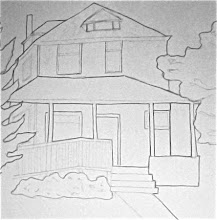
This week I have been laying low from a sudden and unpleasant cold. It was a good excuse to watch cartoons yesterday and is a good excuse to drink plenty of herbal tea while I finish up some writing on my final papers today. Soon I'll be revising like crazy.
My recommended tea:
Ok, it isn't really a tea. It's more like a cooked juice.
Ginger/honey/lemon/cayenne blast
Fresh ginger root
Cayenne powder or red pepper flakes
Lemon juice
Honey
Peel the ginger and smash it with the side of a large chopping knife, then dice it up. Throw at least a thumb length's worth of ginger into a medium saucepan with about a quart of water in it. Add some dry red pepper flakes or a tiny pinch of cayenne. Boil it for a little while on low.
Strain out the ginger fiber/pepper flakes and pour the liquid into a mason jar. Add a liberal amount of honey (if you're me, it's better if it's not too sweet). Once the honey has dissolved, add at least a tablespoon of lemon juice. Drink the whole quart jar over the course of a few hours. This is not a tea for the faint hearted.
Books
Here are my two favorite reads this term:
Balwin, James. Giovanni's Room. New York: Random House. 1956.
I have few things to say about this book other than the prose is beautiful and it is a wonderful story. It's on my short list of recommended readings in 20th century American literature.
Thoreau, Henry David. "Walking" in Wild Apples and Other Natural History Essays by Henry D. Thoreau. Ed. William Rossi. Athens: University of Georgia P. 2000. 59-91.
It is perhaps a little selfish of me to want to drag interested parties into a conversation with me about Thoreau's wacky writing. I'm going to do it anyway. While you read this essay, consider all the (slightly cantakerous) fringey outdoors people or radicals you know and the difficult yet valuable questions they might ask you about how you live.
I'm writing about this stinker of an essay because I am totally compelled by the questions I think Thoreau asks about what experiences of the wild have to do with the way we understand ourselves.

No comments:
Post a Comment